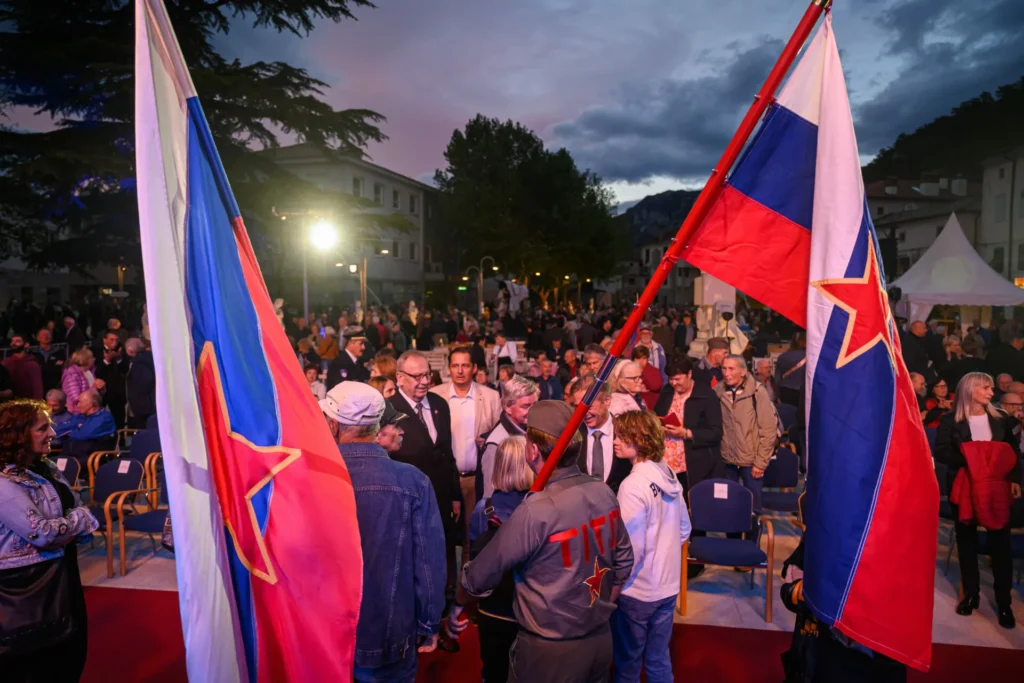The change in the name of a holiday that celebrates The Return of Primorska to the Motherland to a holiday that celebrates its “annexation” does not correspond to historical facts and is not what the experts would have chosen. “Annexation” (Anschluss!) is illegal in international law, as it denotes a violent and unilateral act of appropriation of another country’s territory.
“Annexation is also a word that is often used in international law, for example, in the case of the annexation of Austria to Germany in 1938, the annexation of Ethiopia to Italy in 1937… They seem to have some problems with international law over there at Prešeren’s Street. It’s a pity when they keep mentioning it with such gusto,” commented Dr Miha Pogačnik, an expert on international law, on the change in terminology.
The amendment was proposed by Meira Hot, Vice-President of the Social Democrats party (Socialni demokrati – SD) and Vice-President of the National Assembly. She based her argument in favour of the renaming of the holiday on this government’s most popular buzzword – “depoliticisation,” as well as on local tradition and profession.
These arguments, however, do not carry much weight. After all, there is a political weight to the act of renaming a holiday, local traditions can be based on misnomers, and the act of annexation is contrary to the foundations of international law.
In addition, the consequences of the renaming will also be negative. The leader of the opposition, President of the Slovenian Democratic Party (Slovenska demokratska stranka – SDS), Janez Janša, wrote: “The communists and their proud successors held all the power from 1947 to 2005, with a small gap in between. Despite this, the return of Primorska to the motherland was never established as a holiday. Why? Because they lost us Trieste and Gorizia with the foibas? It was only in 2005, following my suggestion, that we made it a public holiday, and now they are going backwards and making a mess on the very topics where we have already achieved unity. Why? Because from the very beginning, they have been justifying and quenching their lust for power with divisions, strife and quarrels.”
“Nothing that binds us together is sacred to them. On the contrary. What they attack most are the elements of the value centre of the nation. The fundamental values. Slovenian independence, which brought us together, united us, and gave us our own country. And in trying to destroy these values, they are increasingly vocal. Long live Primorska, returned to its motherland, liberated from fascism, Nazism and communism,” Janša wrote.
Well-known historical examples of annexation
The Slovenian diplomatic glossary defines annexation as “a formal act of forcible addition of a foreign territory to a state. For example, during World War II, Italy annexed Ljubljana with Dolenjska and part of Notranjska (Ljubljana province). Russia annexed the Ukrainian peninsula of Crimea after its military occupation in 2014. The annexation is a violation of international law”. We should also add to this probably the most famous “annexation” of all time, the annexation of Austria to Nazi Germany.
Since annexation is an act of “forcible addition of foreign territory to a state,” it is also worth adding that it is illegal under several fundamental instruments of international law. Most importantly: it is fundamentally contrary to the United Nations Charter.
In accordance with the definition written above, the Slovenian left has given the holiday, which, until recently, marked the unification of Slovenian men and Slovenian women in their common homeland, the attributes of illegality and aggression, as well as an element of mental confusion. If we have “annexed” Primorska, just as fascist Italy annexed part of Slovenian land during the Second World War, are we, in fact, saying that it was never Slovenian?
Internal and external political aggression
If the renaming of a holiday gives it the attributes of an aggressive act, the same can be said of the way in which the holiday was adopted. It did not receive a high level of support in the National Assembly when it was first introduced. Namely, 51 MPs voted in favour of it, and 22 against.
Dr Žiga Turk also commented on the situation described above, writing: “I do not have the words to say how wrong it is that the names of public holidays in this country are decided by an override vote. As I write in my book, Holidays (‘Prazniki’), they should bind us together. When the Janša government introduced the Primorska and Prekmurje holidays, it was with broad support. Today, however, they are doing nothing more than looking for a quarrel by renaming them. Disgusting!”
State councillors are also pointing out that the renaming of the holiday does not seem to have broad enough support, reported the Slovenian Press Agency (STA). They pointed out that no referendum or survey was held before the existing holiday was renamed. Those historians who advocate the change have been accused of doing so for ideological reasons. The Council of State was deciding on the veto on the renaming of the holiday on Monday.
Ž. K.


